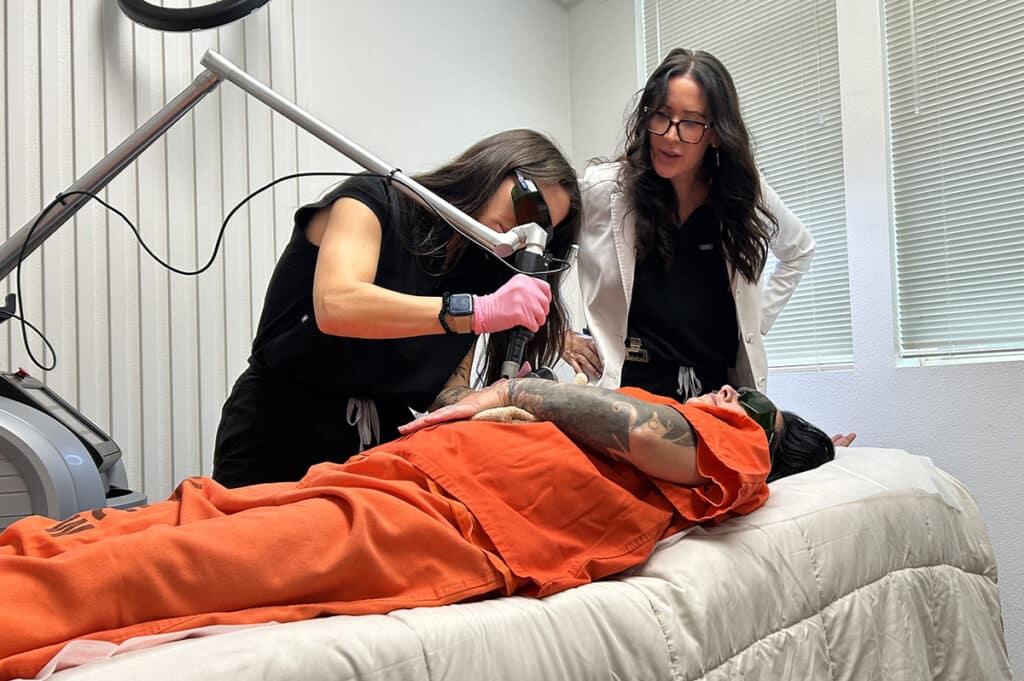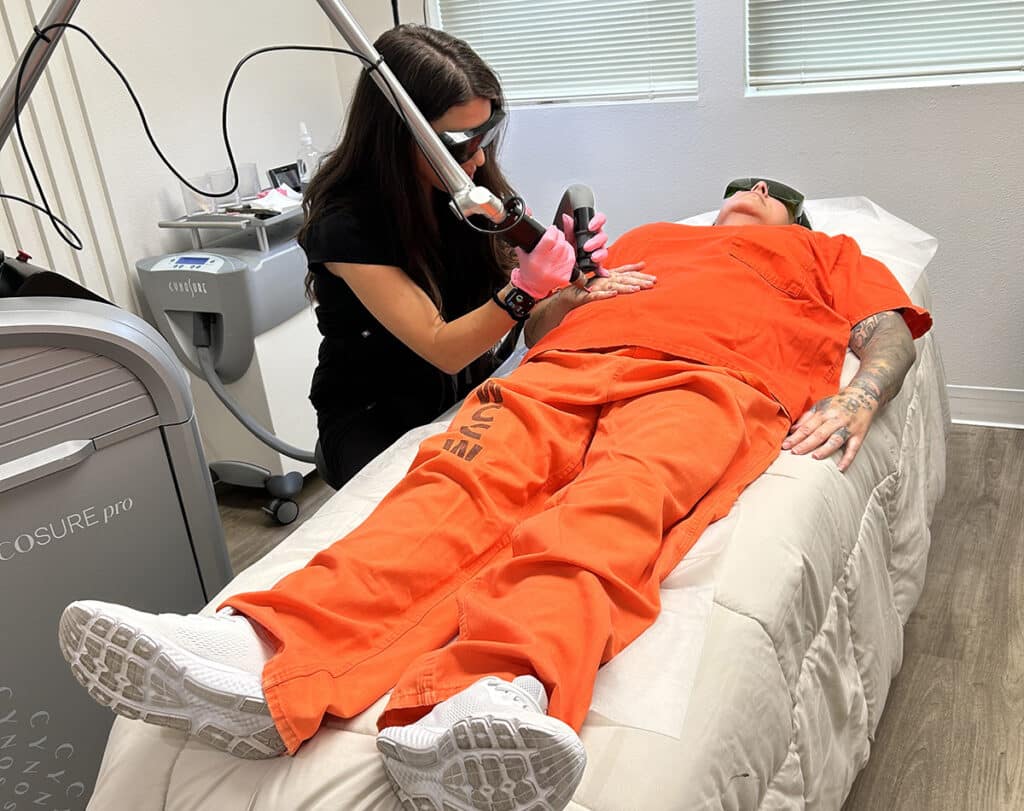Community Police & Fire
New program helps incarcerated women get ink un-done
The state Department of Corrections recently approved a tattoo removal program for women incarcerated at the Washington Corrections Center for Women, allowing inmates to rid themselves of ink that often represents past trauma.
The program offers tattoo removal to incarcerated individuals who were the victim of sex trafficking or were gang-affiliated. The first client, who is scheduled for release within the next year, has already had an initial appointment to begin the process.
Lissé Medical Aesthetics of Gig Harbor, especially Master Aesthetician Jenna Netherton and owner Katrina Flowers-Piercy, helped start the program. The clinic is donating its time and equipment.
Trauma in ink
Netherton got the idea while training staff at other clinics. She met someone who was doing a similar service in their community, and proposed it here.
“My vision started with sex trafficking victims, but morphed into all people who might have tattoos that represent something traumatic, that is no longer a part of their story that they want to break free from so they can re-integrate,” Netherton said. “I believe in people. No matter the trauma they’ve faced or the choices shaped by their past. I believe in restoration, redemption, and their power to rewrite their story. My mission is to remove barriers and stigma so every person has the chance to reintegrate with dignity, hope, and possibility.”
Flowers-Piercy, who is also a physician’s assistant, is happy to donate the time and use of equipment for the program. She encourages her staff to submit ideas for ways to give back.
The clinic will set aside a day per month to focus on the incarcerated individuals who need tattoo removal, she said.

Licensed Master Aesthetician Jenna Netherton removes tattoos from a woman incarcerated individual at the Washington Corrections Center for Women during an appointment at Lissé Medical Aesthetics. Katrina Flowers-Piercy, right, owns the clinic. Photo courtesy of Kari Figueiria
“When someone is exploited, they lose that sense of ownership in their own body, and identity, so our mission is to help erase those marks literally, and emotionally, through trauma-informed care to the patient,” Flowers-Piercy said.
Daily requests
Flowers-Piercy contacted Kari Figueria, associate superintendent of programs at WCCW. Figeuiria submited a proposal to the state Department of Corrections.
“The big barrier has been cost, so we are thankful to Lissé Medical Aesthetics to offer the service for free,” Figueria said. “I’m getting daily requests from different people in the population, and I know that at least 20% would love to have it.”
Incarcerated individuals have tattoos for a variety of reasons, said Figueria, who has worked at the WCCW for 16 years. Tattoos can represent gang affiliations or experience with human trafficking.
She said that gang affiliation tattoos sometimes are tied less to being members of a gang and more to being considered its property.
“I’ve heard them referred to as a brand,” Figueria said. “There is community stigma, and they are linked to trauma, so it’s difficult to move forward.”
Long process of tattoo removal
Appointments needed for the procedure vary depending on the depth of the tattoo, the ink used, and the quality of the tattoo, Flowers-Piercy said. Appointments must be six weeks apart and the procedure requires two staff from the spa. Removing each tattoo can take between six to 10 sessions, she said.
“The first patient had several on her hand and palms, and we were able to do both hands and combined there were eight different tattoos,” Flowers-Piercy said. “Depending on if it’s a sleeve, that would take multiple sessions, but if they are small, on the face or neck, it can be addressed in one appointment.”
DOC’s Washington Way Program granted final approval for the tattoo removal program. It aligns with Washington Way’s focus on preparing incarcerated individuals to return to society, said Courtney Grubb, Washington Way program administrator.
“Washington Way is about moving from command and control to rehabilitation,” Grubb said. “This will have a huge impact for people who have been part of human trafficking. My team helped remove the barriers to get to ‘yes’ for the tattoo removal program, and wrap security around it. With the budget, we are trying to figure out low-cost and no-cost items, and this generous company came forward and was passionate about this.”

Jenna Netherton, a licensed master aesthetician at Lissé Medical Aesthetics, uses a laser machine to remove tattoos from a woman at the Washington Corrections Center for Women. Netherton proposed removing tattoos as a way to help inmates with previous gang affiliations of who were victims of sex trafficking. Sex trafficking victims often enter the prison system.
Photo courtesy of Kari Figueiria
The tattoo removal program is being piloted now. Figueria is developing criteria to identify which incarcerated individuals at WCCW will be eligible for the program.
Complicated logistics
For now, the incarcerated individual must go to the spa, which requires logistics, safety protocol and staff. The prison must follow policy governing incarcerated individuals who leave the campus and how many staff accompany them.
Funding limits how many people DOC can approve for the program. Unless the department can arrange an alternative.
“It’s much easier to bring a provider into the facility than (to) bring the incarcerated individual out, so one thing that I talked about with the spa owner is the potential to get a tattoo removal machine here in the facility, and they could come in here,” Figueria said. “It would be quicker, and safer, so that is a piece of the big picture. In the future we could serve more people, and not disrupt the spa and their operations.”
While the state budget doesn’t allow for such an expensive purchase of a tattoo removal machine, Figueria said the WCCW and the spa are brainstorming ways to get a machine. Only a licensed master aesthetician or an RN can legally operate the laser that removes tattoos.
DOC’s goal for incarcerated people is reentry to their community. Figueria said a big part of that is leaving the past behind.
“At times it’s hard to differentiate from what people here have experienced, even down to a tattoo on a ring finger,” she said. “Who’s to say that isn’t symbolizing something horrific? I’m inspired to have our partnership (with Lissé Medical Aesthetics), and that people are learning about human trafficking.”

